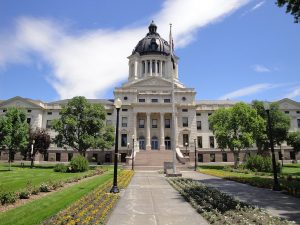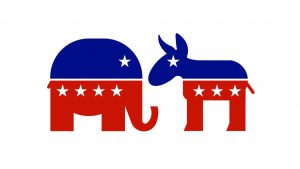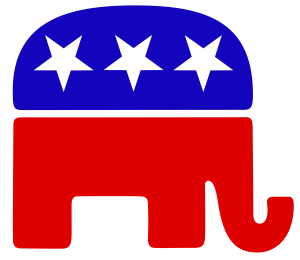As a lifelong Republican and casual observer of South Dakota politics, I have had a nagging feeling for several years that something just wasn’t working right. Then I heard reports from this year’s Republican convention and it started to sink in.
Our 20th century election system has enabled a small right-wing faction to have outsized influence on political dialogue in our state. Recognizing this, I think we would be wise to modernize our election system to include more South Dakotans in the process.
The Republican convention was reportedly a fiasco
The reports from the Republican state convention this summer are concerning. A small, but effective right-wing element in the party got out their vote and nearly disrupted the plans of the complacent majority.
The incumbent Secretary of State was surprisingly dumped for spurious reasons. The incumbent lieutenant governor almost suffered the same fate, but for some last-minute political maneuvering. And Marty Jackley’s bid to return to the office of Attorney General was also nearly sidetracked.
I imagine some conservative Republican office holders (Noem and Thune) are scratching their heads wondering how they suddenly became “liberals.”
Our election system was established in a different time, with different realities
Decades ago, the Republican and Democratic parties were all that mattered in South Dakota politics. Both could field electable candidates. While the Republicans were mostly dominant, the Democrats were certainly relevant with leaders like Daschle, Johnson, Herseth-Sandlin and McGovern. Independents and third parties were not so important.
Over time, the two parties put themselves in charge of the state’s election system, to the exclusion of all others. That may have made sense at the time since they could keep an eye on each other and balance things out.
Eventually, the Democratic party’s influence in the state waned when national Democrats moved left. As the party’s voter numbers in the state decreased, the number of independent voters increased.
Independent voter numbers on the rise
Today 49% of registered voters in South Dakota have chosen to be labelled as Republicans. That number is probably inflated by the fact that non-Republicans are motivated to register as Republican if they want their vote to make a difference. The sagest political advice you can get in South Dakota these days is “regardless of your political philosophy, you might as well register as a Republican so you can have a meaningful voice in elections.” Some are willing to do that, while others understandably refuse to compromise themselves.
26% of South Dakota voters have bravely registered as Democrats, knowing that means they can make little difference in selecting our elected representatives. And 24% have chosen to affiliate with neither party. That number appears to be low based on national trends.
According to recent Gallup polling, 43% of voters in the US now consider themselves independent. Young people especially are opting out of the choice between the two political parties they find objectionable.
Independent voters are second class citizens in South Dakota
While the political landscape shifted in South Dakota, the mechanics of our elections did not. But no one seems to be challenging that. Most South Dakotans accept the legacy election system as is. It is familiar. We know how it works. And we know that we end up with Republican winners either way. But we should at least understand its shortcomings and what they might be costing us.
The two parties control South Dakota’s election processes. The State Board of Elections runs the state’s elections. Six of the seven board members are appointed by elected officials from the two parties. None are appointed by other parties or by independent voters in the state.
On a more local level, county precinct superintendents and their assistants play a big role in South Dakota’s elections. County auditors appoint them from lists submitted by the two parties. The state’s independent voters are left out of the process.
Independents are even discriminated against if they want to run for office. The signature requirements for their nominating petitions for some offices are much greater than for party candidates. This is not fair. (I wonder if it would survive a court challenge.)
Independent voters are excluded from the primaries
Political parties have decided that they should be able to exclude non-party members from participating in taxpayer-funded primary elections. As a result, 142,000 independent voters in South Dakota are often left without a meaningful role in the primary elections they help pay for.
As South Dakota Democrats became less relevant, they invited independent voters to participate in their primary. But that doesn’t accomplish much when the most important election is usually the Republican primary.
A minority of registered voters has absolute control
In recent years we have become a one-party state. With less than half of the state’s registered voters, Republicans enjoy a monopoly on statewide races. They occupy all three federal offices, plus the office of governor, lieutenant governor, attorney general, secretary of state and more.
Republicans also win 90%+ of legislative races. Most legislative races in the state are uncontested or minimally contested, which leads to the observation that if you didn’t get to participate in the Republican primary, you had no voice in choosing your state representatives.
Our legislature wastes time on less important issues
You might think I, as a Republican, should like all this power for my party. But as I mentioned earlier, odd things are happening in our legislature because of it. I think we are all better off if all South Dakotans get to participate equally.
Now that Republicans are in control in our state, the most interesting debates are between Republicans. Lately, conservative Republicans have been challenged from a small, vocal group that is further right politically.
That has led to lots of fussing about seemingly irrelevant stuff like who gets to use which bathrooms. We’d be better off if our legislators would focus on issues effecting more of us, like economic development, healthcare, prisons and housing.

Democracy is a fiction in South Dakota
Our representative democracy does not appear to be working well in South Dakota. Significant groups of South Dakotans have little or no representation or even involvement in the election process. Meanwhile, the Republican party is showing signs of dysfunction.
At the same time, disenfranchised groups of voters sometimes resort to petition drives to try to enact laws like expanding Medicaid and legalizing marijuana. Issues like that seem well suited for a more balanced legislature.
All South Dakota voters should participate equally
All of us would benefit if more South Dakotans had a meaningful role in our elections. I would like to see the legislature update the election administration system to allow independents to have an appropriate role. I would also like to see the Republican party open its primary to independents to broaden the party’s base of supporters and reduce the influence of the vocal right-wing minority.


I agree totally with these comments & analysis.
Totally agree with your analysis.
You are spot on here.
A very accurate analysis of the problem — I only wish we could fashion an equally accurate plan to effectuate its change.
The current system has me changing my registration twice every election cycle —- the first to change my Independent registration to Republican. This has to be early enough to allow me to vote in the primary —- and the second, immediately after the primary, back to Independent status to avoid the stink of the crazy right wing. Republicans.
Is there a way we could register as RINO’’s? A safe place for an aging Reagan-Goldwater conservative?
A true observer of reality. Thank you for sharing what should be mainstream media / news coverage. An answer to part of the issue is to form an independent board for redistricting, with the primary rule being population and square(ish) grids surrounding precincts or establish new ones when necessary.
Legislative control is the key to GOP power in South Dakota. Republicans have held overwhelming control of the South Dakota Legislature since the late 1970s, and the party has steadily drifted further and further to the right, to the point of the party being out of touch with many South Dakotans Nearly all of the U.S. senators and representatives who have represented South Dakota in recent decades started their political careers as legislators or working for state government in other positions. We, as voters, should take legislative elections more seriously and not just vote for the candidate who claims to be the most conservative.
Great insight into a disturbing trend in American politics. As a South Dakota native, I voted Republican for many years. My preference would have been more independent because as I got older, I identified more with moderate Democrats. To your point, Joe, more and more the minority is deciding what the issues are. I have observed that in the past 10+ years, our elections are more about power than leaders who represent their constituents and the issues important to them.
When you have 50% of any population not being represented, it is a big concern. The bigger problem is the unwillingness of our elected officials to work together for
the issues you stated.
Good commentary on SD politics. I’m not a fan of the trend.
Great analysis, Joe! I suspect that the same reality is true for many states in our nation. We have LOTS of work to do. Thank you for all that you do.
Yes very true, Joe!
Great analysis, Joe! I suspect this reality rings true for many states in our country. We’ve got LOTS of work to do. Thanks for everything that you’re doing!
Thank you, Joe, for this. As one of the “brave” 26% I truly appreciate your moderate Republican viewpoint. Centrist Democrats and Republicans were (and still are) able to solve problems together. We are now in a state of perpetual policy inertia in our legislative bodies. This has pushed regular people to utilize the ballot measure process beyond what it was initially meant for, but we must keep moving us all to a better situation (main reason I’m a Democrat). Please read this article on how Senator Rounds was verbally attacked at his own gathering. It is frightening. Dangerous factions are emerging. We all must work together to push this negative and dangerous trend back into history. https://www.bhpioneer.com/local_news/tables-turn-on-rounds-at-round-table-talk/article_4c7a0b9e-1ffe-11ed-82b2-af4c0b0e3652.html?utm_medium=social&utm_source=email&utm_campaign=user-share
I appreciate your analysis Joe. I am a past member of the SD Republican Central Committee who left the party during the Newt Gingrich era. I have had a lifetime of being in the middle of totalitarian events and have felt comfortable that American capitalism & democracy had a resiliency and/or stability that communist and fascist systems did not. In 1972 I was in Prague which was 4 years after the Soviets marched in to put down reforms proposed by Alexander Dubcek. Soviet troops were everywhere. In 1990, Jan & I traveled to Romania to adopt our 2nd son, which was 10-11 months after the fall of the Berlin wall. It was chaos with rumors of counter revolution circulating daily. Living by “our wits” was common place. In 1995-96 I was a USAID volunteer serving 2 months in the former Soviet Republics of Uzbekistan & Turkmenistan. Revolving loan funds had been established but inflation was running 100%/month and no one knew how do to a business plan. The US Capitol violence of January 6th and the disrespect of Senator Rounds in Spearfish recently has me worried that my confidence in American democracy has been naive. I am appalled that the “Big Lie” continues to be circulated even though the notion of a conspiracy of hundreds of election workers in 5-7 key states to pull off an stolen national election is ridiculous. State Senator Lee Schoenbeck has referred to radical SD Republicans as “Wackadoddles” and at the State Republican Convention in Watertown this year, these folks proudly wore buttons proclaiming themselves to be “Wackadoddles..” These folks want to eliminate school vaccinations as well as other common sense stuff. So suffice it to say, I am worried and don’t know if Ranked Choice voting is enough to make SD voters less disenfranchised. The more we talk about it and worry about, maybe some rational thinking can prevail.
I was always a Republican until the advent of the Tea Party and the new extreme right wingers. I’m now a registered Independent. The moderate Republicans are not RINOs. These new extremists who bare no resemblance to the GOP are the real RINOs!
Joe,
Thank you for sharing your thoughts with us. I serveed in the legislature for four years as a moderate Republican. Since that time, the GOP has moved further and further to the right. Their rhetoric plays upon our ignorance and fear. The Republican Party once was a party of principles and principled people. While there are a few remaining individuals of integrity, the party has long since abandoned its core principles. That is why I left the party and registered as a Democrat. I am currently a candidate for the Minnehaha County Commission.
You made your bed. Have fun sleeping in it.